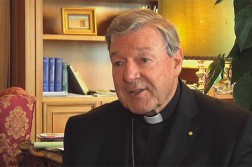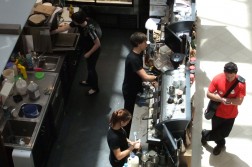What does the end of the financial year mean to you? Is it just another excuse to get drunk and overeat, or were you going to do that anyway, you fat slob?
Is it yet another holiday that has been corporatised and commercialised to within an inch of its life, just like Easter or Mother’s Day, except that instead of being pressured to buy masses of chocolate and ugly greeting cards, you’re being pressured to minimise your tax and get up early to go and wander in a daze around department stores until you find yourself in the carpark three hours later with a trolley full of inflatable kiddie pools and street directories, with no recollection of how you got there except the haunting echo of the words "Happy EOFYS" reverberating in your skull like the mocking laughter of the checkout operator when you told her you didn’t have a Fly Buys card?
I think that above all else, the end of the financial year is a time for reflection, this year more than ever, given the enormous role finance has played recently in the progress of the body politic, the advance of social debate, and of course the permanent blighting of all our hopes for the future. This was a financial year in which the very word "financial" could bring a shiver of terror down one’s spine, connected as it so often was with other dread terms like "crisis", "collapse" and "Swan".
Many economists have described it as the "year from hell", and you can see why; this link shows clearly that the squiggly line went down a lot in the last year, and also went up, but not by enough, a development technically known in the financial business as "bad".
What caused this going-down-by-more-than-going-upness? Theories vary — the global financial crisis has been blamed on capitalism, insufficient regulation, excessive regulation, Kevin Rudd, unions, Rupert Murdoch, childhood obesity, Richard Wilkins, and most credibly of all, God. Any or all of these theories may be correct, but whoever is to blame, there is no doubt that the crisis has brought some big changes in the way we live our lives. Consider that in the past year:
There has been a 150 per cent increase in the total volume of newspaper columns stating that "we have not yet seen the worst of the financial crisis".
There has been a 70 per cent increase in the number of commentators telling us that the global financial crisis presents a "unique opportunity to transition to a green economy".
There has been a more than 600 per cent increase in use of the word "stimulus".
This has not been as exciting as one might think.
The Australian Government has assumed a debt burden that is estimated by top coalition analysts to now exceed eight thousand trillion and growing.
Rebecca Gibney won a Gold Logie.
Any one of these developments on its own might not seem so bad, but taken together they add up to an undeniable trend toward catastrophe, a catastrophe that can surely only be averted by the complete dismantling of our financial system and establishment of a fairer, more equitable and more efficient system, based on the principle of the economy as a means to the end of human and social development. So we may as well make the most of it. Yes, apocalypse is upon us. Yes, this is, as Alan Greenspan said, a financial "tsunami". But like all tsunamis, this one has a bright side.
In the case of the "water tsunami" of financial year 2004–05, the upside was the enormous boost in self-esteem we all gained from an appreciation of our own generosity. In the case of the financial tsunami, we start with the advantage of not having to think about all the depressing dead people, but that’s not all. The best thing about the GFC is that it’s caused the falling stockmarket, which has upset people who invest in the stockmarket, which is, frankly hilarious.
You know these people. Going on and on about their "portfolios" and their "strategies" and their "heavy weighting towards recurring consumables". Don’t you hate them? Don’t you read the financial advice columns — "I have a major problem, I have $500,000 in cash and three $8 million investment properties, should I go into oil or just roll naked in a puddle of molten platinum?" — and fantasise about stabbing them in the face? Well, fortune has come to your aid; the global economy has stabbed them in the face for you.
So the past financial year has brought its tragedies and its humour. Most of all it has brought change. Who knew, a year ago, that we’d be here? In July 2008, who knew that Brendan Nelson’s inept political skills and astounding lack of popularity would lead him to relinquish the Liberal leadership? Who knew that Peter Costello, having held back from challenging for the top job, would continue to do so? Who knew that Wayne Swan would turn out to be nervous and evasive in interviews? Who knew that there existed a person called "Godwin Grech" anywhere on Earth?
Who knew that TV pranksters The Chaser would abruptly abandon their comedy careers and begin raping and murdering terminally ill children? Who knew that just as we were passing into a new financial year, thinking about tax cuts and group certificates and low low prices, we would be rocked to our foundations, fiscal concerns forgotten and priorities drastically re-calibrated as all the notions of popular culture we held so dear were shattered by the tragic death of Mollie Sugden?
Who knew that indigenous disadvantage would persist, despite the Apology? Who knew that climate change would turn out to be a complete hoax? Andrew Bolt did, but we didn’t listen to him. More fool us. "Who’s the ideologically rigid psychopath suffering from a homoerotic obsession with ex-treasurers now?", he can rightfully shout at us, and we’ll just have to take it. Maybe next time we’ll pay attention to his graphs.
No, nobody realised just how different the world today would be from the world of a year ago — nobody saw the strange, terrifying, 1950s-sci-fi-ish future looming. And likewise, nobody knows how the coming financial year will pan out. All we can do is wait and hope and write millions upon millions of pointless words, filling in time before the next nightmare descends. Maybe it will be swine flu. Maybe it will be earthquakes. Maybe it will be Twitter.
But for now, we can gather around the end of financial year tree, exchange massively discounted gifts, and collectively thank God that the last one is over.
Happy NFY everyone.
Donate To New Matilda
New Matilda is a small, independent media outlet. We survive through reader contributions, and never losing a lawsuit. If you got something from this article, giving something back helps us to continue speaking truth to power. Every little bit counts.



